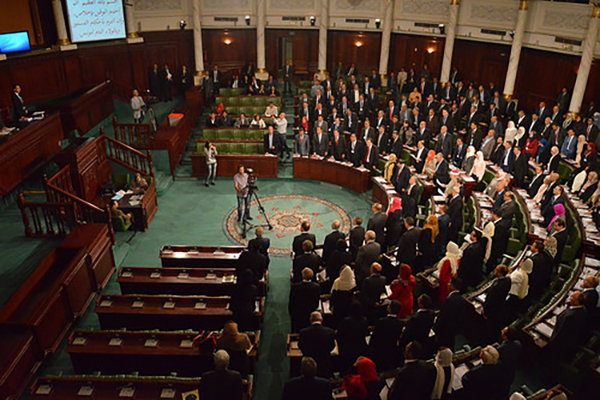Tunisia’s Newly Elected Parliament Passes State Budget and 2015 Finance Law
On Wednesday the Assembly of People’s Representatives (French: ARP) passed both the first draft of the state budget and the Finance Law of 2015. Working long into the night and breaking constitutional deadlines, the ARP’s work has established the government’s budget for the upcoming year and has put into place economic reforms aimed at easing the country out of its economic slump.
The state budget law outlined the level of funding various ministries and government institutions were to receive. The Ministries of the Interior and Defense received 15% of the total budget, with 2615 million dinars going the Ministry of the Interior and 1792 million dinars being granted to the Ministry of Defense. The Prime Minister’s budget was reduced from 253.8 million dinars in 2014 to 147.2 million dinars this year.
The Presidency’s budget increased by 8.7%, from 81.1 million dinars to 88.156 million. Other ministry budgets were: Ministry of Education: 3820.2 million, Ministry of Industry: 2199 million, Ministry of Health: 1599 million, Ministry of Commerce: 1588 million, Ministry of Agriculture: 1135 million, and the Ministry of Higher Education: 1286 million. The ARP also saw their budget increase by 3% compared to the ANC’s last year, being allocated 21.714 million dinars.
The Truth and Dignity Commission, which officially opened yesterday, was given a budget of 10 million dinars. The IVD’s budget was the only article that created some debate among the parliament, with Noureddine Bhiri of Ennahdha asking for members to reflect on the proposed budget. However, Nidaa Tounes refused the demand and the vote was carried out without any proposed changes to the article.
The ARP also passed the 2015 Finance Law with 147 members voting for, 15 against, and 10 abstentions. The law lays out certain economic and fiscal developments that hope to get the country back on its feet. The law was extended to allow exporting companies to sell 50% of their produce locally, up from 30% in 2014, and set new guidelines for customs officials. An article on bank recapitalization failed to go through and will be debated in a complementary law in 2015.
Although the parliament successfully passed both laws, they also overstepped one constitutional requirement by a small margin. Article 66 of the new constitution states that “the financial law will be adopted at the latest on the 10th of December.” Although the law was passed in a session starting on the 10th, it was officially voted in at 3 AM on the 11th, meaning that the parliament broke constitutional law by 3 hours. All things considered, the budget was passed smoothly and without conflict. Its real test will be its ability to bring the Tunisian economy back to life after several years of damage from instability and sub-par economic governance.
By Louis Bonhoure | Published in Tunisia Live | Dec 11, 2014
